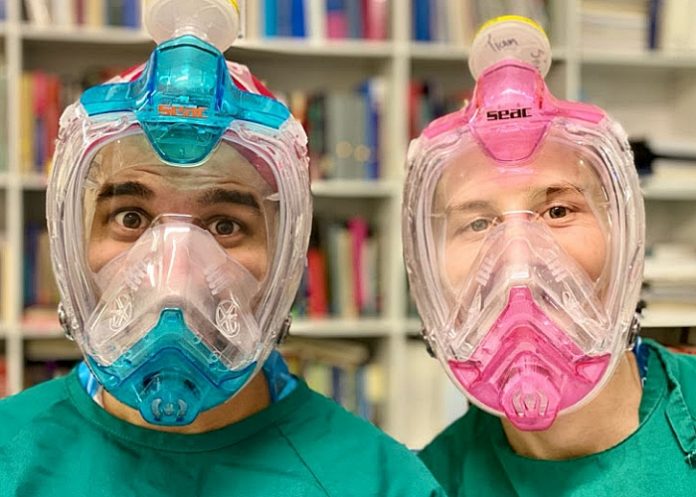Simulations at the universities of Pretoria and Cape Town found wide approval of full-face snorkel masks among the 52 doctors who tried them, according to a study the African Journal of Emergency Medicine.
Researchers said the masks could be a viable alternative during aerosol-generating procedures when standard personal protective equipment (PPE) is not available.
“The full-face snorkel mask is an expensive alternative to the N95 and visor – although we don’t advocate replacement of traditional PPE, it could be a viable alternative when N95s are not available. It was reportedly easy to speak while wearing the mask, although some participants perceived that they were not always understood,” the researchers are quoted as saying in a TimesLIVE report.
Twenty-one participants experienced a subjective physiological effect from wearing the mask; most commonly a sensation of shortness of breath.
The researchers were led by Ronel Herselman, head of undergraduate and surgical skills laboratories at Pretoria University’s health sciences faculty.
The microbial filter used in the test was 99.99% effective at capturing aerosols, the lightweight particles from a patient's respiratory tract that can remain suspended in the air.
Benefits of snorkel masks include limitation of direct hand contact with the face, protection against large droplets, and reusability in times of equipment shortage. They are also cheaper than single-use respirators if used frequently.
“Our research suggests that the adapted full-face snorkel masks were considered safe, easy to use and comfortable, with limited chances of cross-contamination during donning, doffing, and when performing procedures,” said Herselman.
Study details
Adapted full-face snorkel masks as an alternative for COVID-19 personal protection during aerosol generating procedures in South Africa: A multi-centre, non-blinded in-situ simulation study
Ronel Herselman, Vidya Lalloo, Veronica Ueckermann, Daniel J.van Tonder, Edwinde Jager, Sandra Spijkerman, Wanda van der Merwe, Marizanedu Pisane, David Stanton, Ross Hofmeyr
Published in African Journal of Emergency Medicine on 13 September 2021
African relevance
* South Africa has to-date diagnosed more than 1,500,000 cases of SARS-CoV-2 infection. Despite several international studies on the efficacy and safety of the full-face snorkel mask as an alternative to N95 respirators, goggles and face shields, they are not commonly available or used in high-risk settings such as emergency centres and critical care units in Africa.
* Adapted full-face snorkel masks can be used as PPE by HCWs. It is, however, important to examine the development of standardized procedures for donning, doffing and decontamination of these masks in the African context.
* Local studies on these masks can contribute to creating awareness of safe and suitable alternatives amidst global shortages of traditional personal protective equipment.
Abstract
Introduction
SARS-CoV-2 has resulted in increased worldwide demand for personal protective equipment (PPE). With pressure from ongoing epidemic and endemic episodes, we assessed an adapted snorkel mask that provides full-face protection for healthcare workers (HCWs), particularly during aerosol-generating procedures. These masks have a custom-made adaptor that allows the fitment of standard medical respiratory filters. The aim of this study was to evaluate the fit, seal and clinical usability of these masks.
Methods
This multicentre, non-blinded in-situ simulation study recruited 52 HCWs to don and doff the adapted snorkel mask. Negative pressure seal checks and a qualitative fit test were performed. The HCWs completed intubation and extubation of a manikin in a university skills training laboratory, followed by a web-based questionnaire on the clinical usability of the masks.
Results
While fit and usability data were generally satisfactory, two of the 52 participants (3.8%) felt that the mask did not span the correct distance from the nose to the chin, and three of 34 participants (8.8%) who underwent qualitative testing with a Bitrex test, failed. The majority of users reported no fogging, humidity or irritation. It was reportedly easy to speak while wearing the mask, although some participants perceived that they were not always understood. Twenty-one participants (40%) experienced a subjective physiological effect from wearing the mask; most commonly a sensation of shortness of breath.
Discussion
A fit-tested modified full-face snorkel mask may offer benefit as a substitute for N95 respirators and face shields. It is, however, important to properly select the correct mask based on size, fit testing, quality of the three-dimensional (3D) printed parts and respiratory filter to be used. Additionally, HCWs should be trained in the use of the mask, and each mask should be used by a single HCW and not shared.
See more from MedicalBrief archives:
Most blue surgical masks ineffective against COVID-19 — Canada study
CDC's health sector masking guidelines were a deadly mistake
ECDC report: Face mask effectiveness in reducing COVID-19 transmission

